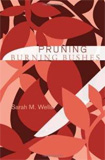February 20, 2013PRUNING BURNING BUSHES by Sarah M. Wells
Review by Mary Harwell Sayler
Wipf & Stock
199 W. 8th Ave., Suite 3, Eugene, OR 97401
ISBN: 13:978-1-62032-330-4
2012, 75 pp., $12.00
www.wipfandstock.com
The miracle of the Burning Bush, which carried Moses through a series of miracles and a forty-year wilderness experience into a close relationship with God, enticed me to request this book from my own patch of wilderness.
Upon its arrival, I immediately found the lovely lyrics of the opening poem, “Cascade Valley,” cascading me and, undoubtedly, other readers into a collage of sounds, images, and teachable moments fraught with such lines as “…we throw the broken limbs/ into rushing floodwaters/ to see how quickly we could be carried/ away,” but ending on the poignant note: “Reach down, my child,/ bring a pine cone home to show/ how miraculously we are carried.”
I didn’t even reach the second poem before becoming impressed by the quiet voice, imagery, and subtle wisdom, and so I kept on reading. How could I not? Especially since what drew me to this book in the first place was the audacity of the title.
Look at the title and you’ll see how miraculously it carries readers into the book and yet presents at least the hint that God’s work might need pruning. Admittedly, this makes me curious to gain answers to even more curious questions: Will the poet get heavy-handed with God’s mysterious methods? Will she bring me to Moses and the occasional wilderness experience of a dry spiritual moment? Or, will she work through God’s curious ways to arrive at some kind of resolution, and, if so, at what cost—to herself, to poetry?
Temporarily, however, a sequence of alliterative sounds in the poem “Angry” distracted me as the first verse produced stout echoes coming from the long “eeeee” of sees/ seethes/ weeds/ heaves/ heap. By the second verse these quickly gave way to the heavy breathing employed by manual labor in “uuhhh” sounds found in shrubs/ shudder/ shadow, pushed/ pulled. I’m thinking all of this is going somewhere, “And then mulch” tones down the sound and subtle fury of “Angry” with the gardener (presumably The Gardener) “who stands back,/ fists on hips.”
Were it not for the title, those fists could be a mere sign of determination. Indeed, gardening-gloved fists have found their way onto my hips, too, after an afternoon of thwarting thorns and wrestling vines to conquer the chaos of an overgrown bush. I’ve even been known to prune a bush almost to the ground—not in anger or judgment, which, the bush most likely feels, but for the knowledge that a good pruning removes what’s dead, strengthens the whole bush, causes new growth, and rewards one with new blossoms and new fruit.
As signs of audacity waned, the poems began to explore the personae of place. For instance, the poem “Ohio” admits, “I did not see myself deciduous,” which is a fresh way of saying what the Psalmist of Psalm 90:12 implied: “Teach us to number our days, so we may be wise.”
Knowing we’re deciduous reveals God all the more evergreen. But for those who might fear the poet’s quiet quest will mire you with heavy theology I’ll skip over the insightful poem “Consider the Sparrow” and the difficulties of Simon Peter in “Sifted as Wheat” and invite you to consider the communion found in a pitcher of beer and a game of pool as “Jesus Walks into a Bar.”
Since I’m not fond of beer or even its smell, I have no similar experiences for my poems, which are more apt to have Jesus walking through walls or knocking on the door like a well-dressed salesman. Regardless of the chosen form, genre, or imagery, every Christian communicator who wants to write well will keep looking for fresh ways to introduce readers to the Christ, the Bridegroom, who, as these poems indicate, just might have a “Honky-Tonk Bride” in the church, especially if, “[t]he ladies quilting club is out today.”
Sarah Wells explores such amusing and amazing options through the use of everyday subjects and down-to-earth settings that at some point include almost everyone. But to clarify her provocative title from my perspective, she keeps the pruning shears ready to prune her own thoughts, not God’s work and not her readers. Nevertheless, most of us will find ourselves prodded by this book of well-written poetry into loosening our ground and aerating our souls.